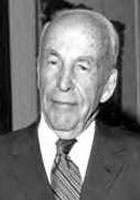Archibald MacLeish Quotes
Poets ... are literal-minded men who will squeeze a word till it hurts.
The business of the law is to make sense of the confusion of what we call human life—to reduce it to order but at the same time to give it possibility, scope, even dignity.
It is not in the world of ideas that life is lived. Life is lived for better or worse in life, and to a man in life, his life can be no more absurd than it can be the opposite of absurd, whatever that opposite may be.
The dissenter is every human being at those moments of his life when he resigns momentarily from the herd and thinks for himself.
Conventional wisdom notwithstanding, there is no reason either in football or in poetry why the two should not meet in a man's life if he has the weight and cares about the words.
We are as great as our belief in human liberty—no greater. And our belief in human liberty is only ours when it is larger than ourselves.
To see the earth as we now see it, small and beautiful in that eternal silence where it floats, is to see ourselves as riders on the earth together, brothers on that bright loveliness in the unending night—brothers who see now they are truly brothers.
The American mood, perhaps even the American character, has changed. There are few manifestations any longer of the old American self-assurance which so irritated Dickens.... Instead, there is a sense of frustration so perceptible that even our politicians ... have attempted to exploit it.
What happened at Hiroshima was not only that a scientific breakthrough ... had occurred and that a great part of the population of a city had been burned to death, but that the problem of the relation of the triumphs of modern science to the human purposes of man had been explicitly defined.
What is more important in a library than anything else—than everything else—is the fact that it exists.
